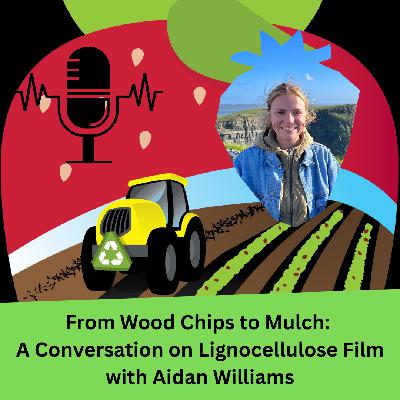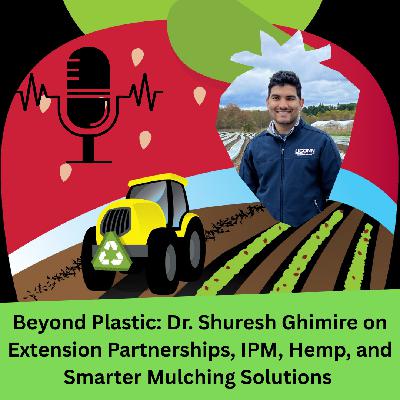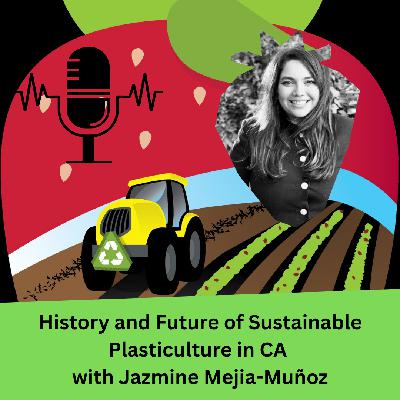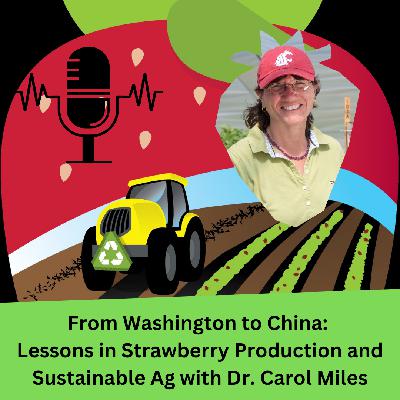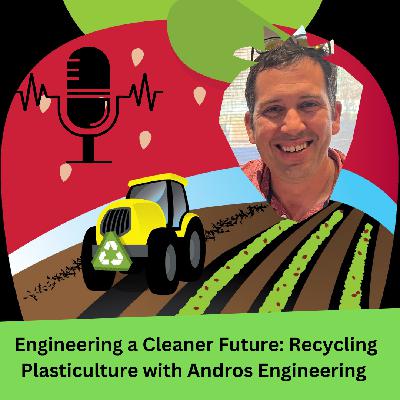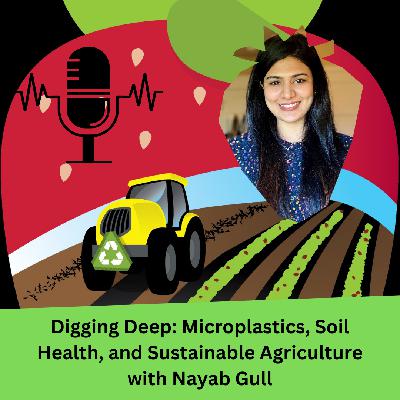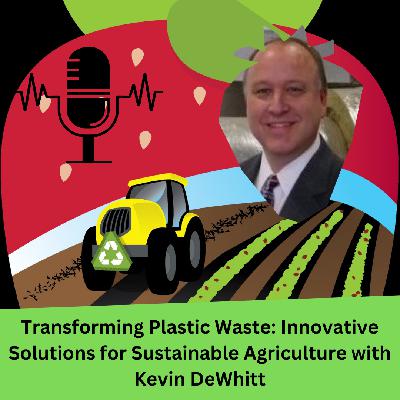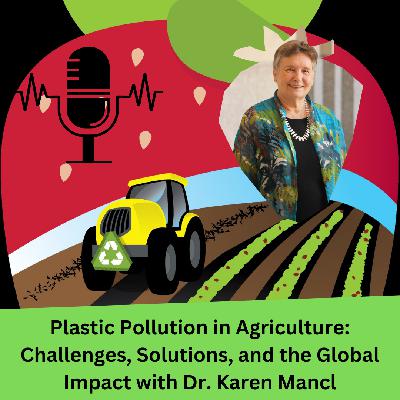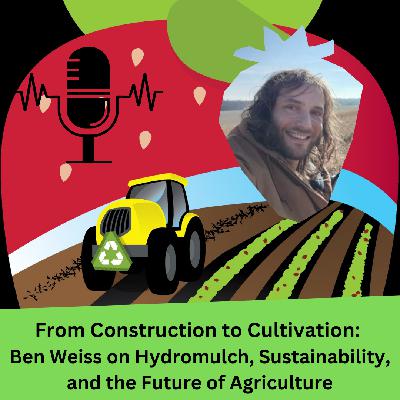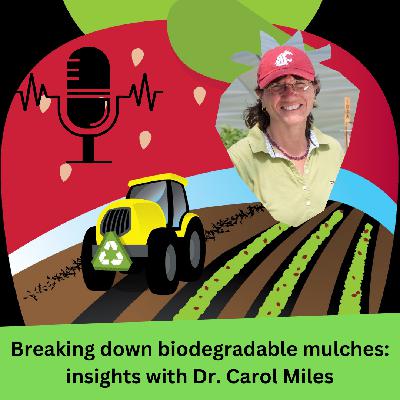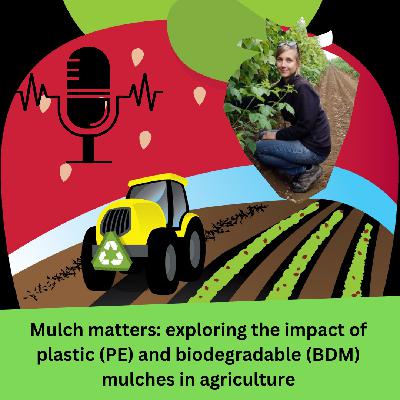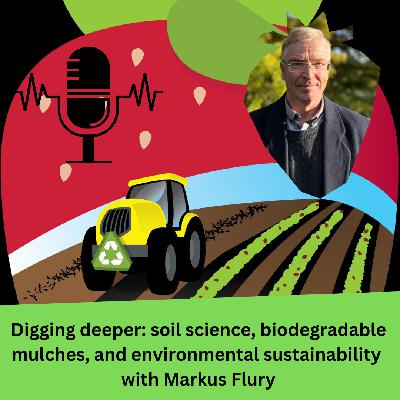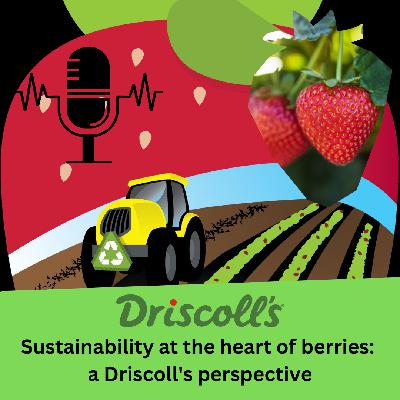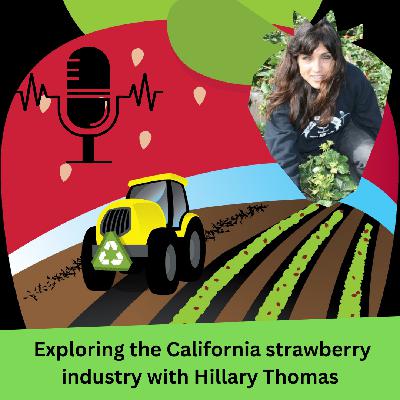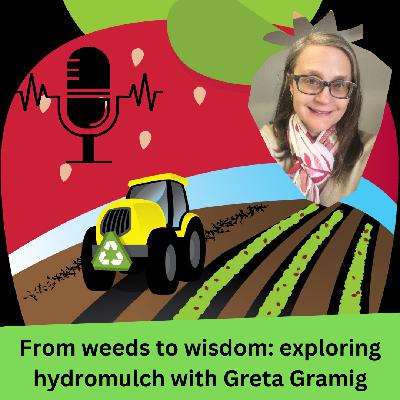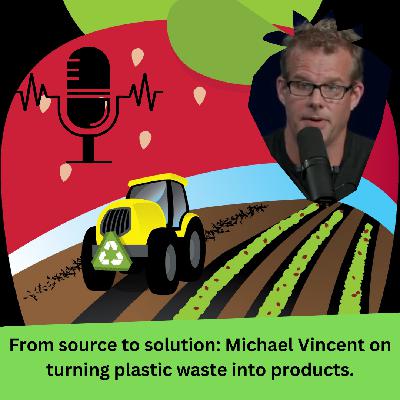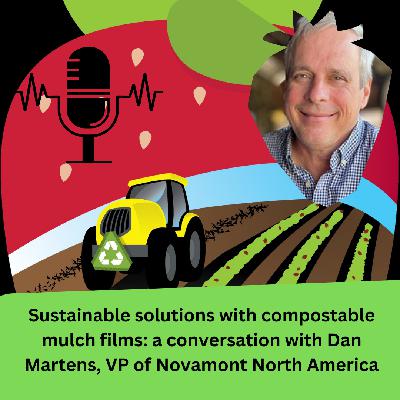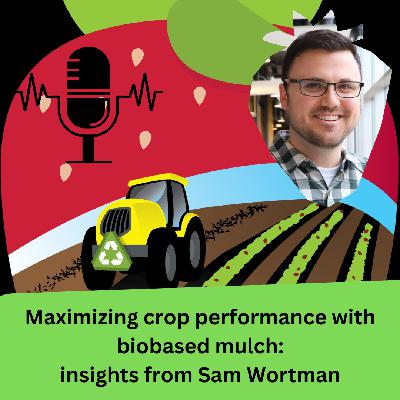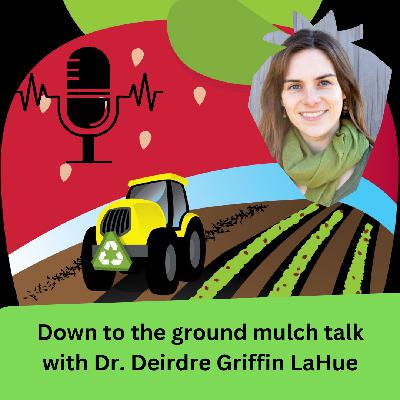Discover Mulch Matters
Mulch Matters

Mulch Matters
Author: Nataliya Shcherbatyuk
Subscribed: 1Played: 4Subscribe
Share
© 2023
Description
We are here to update you on the latest research about BDM and recycling options PE mulch as well as help you to answer any questions you might have. In each episode, we’ll dive into the latest research, trends, news, and insights on why mulch matters and how we can improve plastic mulch end-of-life options. We'll also branch out and discuss other plastics as well as talk to researchers, experts, and practitioners in the field who will share their insights and experiences on how to use mulch effectively in different settings.
23 Episodes
Reverse
In this episode we’re diving into a type of mulch you may not have heard much about—lignocellulose film (LCF). Joining me is Aidan Williams, who has been researching this bio-based biodegradable mulch made from renewable woody biomass. Aidan shares her journey into agroecology, how LCF is produced, and why it could be a promising alternative to plastic and paper-based mulches. We also explore results from her greenhouse raspberry trials, insights on soil degradation experiments, and even consumer perspectives on biodegradable mulches. If you’re curious about sustainable solutions for agriculture, or just want to learn how science and innovation are reshaping the future of mulch, this episode is for you! 🌱✨ This work is supported by Specialty Crops Research Initiative Award 2022-51181-38325 from the USDA National Institute of Food and Agriculture. Any opinions, findings, conclusions, or recommendations expressed on this podcast are those of the author(s) and do not necessarily reflect the view of the U.S. Department of Agriculture. Note: intro and outro music credit to Zakhar Valaha from Pixabay https://pixabay.com/music/introoutro-motivational-ident-main-9923/
In this episode of Mulch Matters, we welcome Dr. Shuresh Ghimire, Associate Extension Educator and IPM Specialist at the University of Connecticut. From his roots on a small farm in Nepal to leading integrated pest management programs in the USA, Shuresh shares his journey, expertise, and insights into sustainable agriculture. The conversation dives into: Why integrated pest management (IPM) is critical for balancing environmental, economic, and social priorities. The real-world benefits and challenges of using biodegradable mulches (BDMs) vs. polyethylene mulch (PE). Economic and environmental reasons why growers in the Northeast are embracing BDMs. How hemp production is evolving in Connecticut. The importance of partnerships among universities, agencies, and farmers to drive agricultural innovation. Whether you’re a grower, researcher, or sustainability advocate, this episode offers practical knowledge, inspiring stories, and a fresh perspective on the future of mulch management and sustainable farming. This work is supported by Specialty Crops Research Initiative Award 2022-51181-38325 from the USDA National Institute of Food and Agriculture. Any opinions, findings, conclusions, or recommendations expressed on this podcast are those of the author(s) and do not necessarily reflect the view of the U.S. Department of Agriculture. Note: intro and outro music credit to Zakhar Valaha from Pixabay https://pixabay.com/music/introoutro-motivational-ident-main-9923/
In this episode of Mulch Matters, we speak with Jazmine Mejia-Muñoz, Water Quality Program Manager at the California Marine Sanctuary Foundation, about the intersection of agriculture, conservation, and plastic use in California’s iconic Monterey Bay region. Together, we explore the deep-rooted history of plasticulture, the evolving role of biodegradable mulches (BDMs), and what it takes to transition toward more sustainable practices in high-value cropping systems like strawberries. Jazmine shares real-world insights from grower collaborations, lessons from field trials, and challenges of BDM use in rotational systems. From labor costs and landfill fees to microplastic misconceptions and grower education, this episode dives into both the science and human stories behind the mulch. Whether you're a grower, researcher, or sustainability advocate, this episode offers a well-rounded look at why mulch matters—and how collaborative innovation can lead to healthier soils and cleaner waters. This work is supported by Specialty Crops Research Initiative Award 2022-51181-38325 from the USDA National Institute of Food and Agriculture. Any opinions, findings, conclusions, or recommendations expressed on this podcast are those of the author(s) and do not necessarily reflect the view of the U.S. Department of Agriculture. Note: intro and outro music credit to Zakhar Valaha from Pixabay https://pixabay.com/music/introoutro-motivational-ident-main-9923/
In this episode of Mulch Matters, we are joined by Dr. Carol Miles from Washington State University, for a compelling conversation about her recent trip to China to attend the International Strawberry Symposium. Our discussion offers a fascinating window into the contrasts and connections between Chinese and U.S. agricultural practices, particularly around strawberry production and plastic mulch use. Carol reflects on the incredible technological leap she observed in Chinese greenhouses, where high-tech, hydroponic tabletop systems are now used in showcase facilities. But she also shares her experience visiting local farms after the symposium, where strawberry production looked much more traditional—though still impressive. One of the most striking takeaways was how small-scale farms in China can remain highly profitable and deeply integrated into the community, offering lessons in sustainability and land stewardship that may be overlooked in the U.S. This conversation is not only an agricultural deep-dive—it’s a thoughtful reflection on culture, economy, and the future of food systems. Whether you’re a grower, researcher, or simply curious about how other countries are innovating in agriculture, this episode will leave you with fresh perspectives and new questions to consider. This work is supported by Specialty Crops Research Initiative Award 2022-51181-38325 from the USDA National Institute of Food and Agriculture. Any opinions, findings, conclusions, or recommendations expressed on this podcast are those of the author(s) and do not necessarily reflect the view of the U.S. Department of Agriculture. Note: intro and outro music credit to Zakhar Valaha from Pixabay https://pixabay.com/music/introoutro-motivational-ident-main-9923/
In this episode of Mulch Matters, we sit down with Ben Andros, President of Andros Engineering, to explore how innovative machinery and thoughtful design are transforming the way we manage plasticulture in agriculture. From recycling drip tape and mulch film to collaborating with researchers on sustainable solutions, Ben shares the journey of tackling one of ag's biggest waste challenges—with humor, heart, and high-tech tools. Tune in for a behind-the-scenes look at ag-tech innovation, real-world challenges in plastic recycling, and why teamwork across sectors is key to building a cleaner future. Note: intro and outro music credit to Zakhar Valaha from Pixabay https://pixabay.com/music/introoutro-motivational-ident-main-9923/
In this insightful episode of our podcast, we welcome Nayab Gull, a Ph.D. student at Washington State University, to discuss the complex and critical topic of microplastics in agricultural soils. From her unexpected journey into agriculture to her cutting-edge research on microplastics and soil health, Nayab shares both personal stories and professional insights. We explore how microplastics impact soil structure, water retention, microbial life, and even plant root development. Nayab also sheds light on the potential risks microplastics pose to food safety and human health, emphasizing the urgent need for more field-based research and policy action. You will learn about the dual role of microplastics—how they can both disrupt and, in some cases, enrich nutrient cycling—and what farmers and policymakers can do to mitigate these effects. Whether you're a researcher, farmer, student, or simply curious about soil sustainability, this episode offers valuable perspectives on why mulch—and what it leaves behind—truly matters. This work is supported by Specialty Crops Research Initiative Award 2022-51181-38325 from the USDA National Institute of Food and Agriculture. Any opinions, findings, conclusions, or recommendations expressed on this podcast are those of the author(s) and do not necessarily reflect the view of the U.S. Department of Agriculture. Note: intro and outro music credit to Zakhar Valaha from Pixabay https://pixabay.com/music/introoutro-motivational-ident-main-9923/
In this episode we have an engaging conversation with Kevin DeWhitt, the founder of PDO Technology, about the pressing issue of plastic waste management in agriculture. As the world grapples with plastic pollution, innovative solutions are needed to tackle this environmental challenge. Kevin brings his expertise in pyrolysis, a cutting-edge process that breaks down plastic mulch waste and repurposes it into valuable resources. This process not only reduces landfill dependency but also supports a circular economy, promoting sustainability in agricultural practices. During our discussion, Kevin explains the intricate workings of PDO Technology and how it efficiently processes agricultural plastics, even when they are contaminated with soil or organic matter. Unlike conventional recycling methods that struggle with dirty plastics, PDO’s technology thrives in handling the toughest waste, ensuring that no plastic is left behind. He also highlights the importance of collaboration with farmers, universities, and industry leaders to create a comprehensive approach to waste management. The conversation delves into the challenges and breakthroughs in plastic recycling, from logistical hurdles in waste collection to technological advancements that make recycling more feasible. Kevin shares insights into the evolving landscape of sustainable agriculture and how innovative solutions are shaping the future. His passion for sustainability is evident as he discusses the potential for widespread adoption of these technologies, paving the way for a more responsible and efficient system for handling plastic waste. As the world shifts towards more sustainable practices, it is crucial to explore viable alternatives for managing agricultural plastics. This episode provides valuable insights into the role of science, technology, and collaboration in driving meaningful change. Listeners who are interested in cutting-edge recycling technologies, sustainable farming, or practical solutions for plastic waste management will find this discussion both informative and inspiring. This work is supported by Specialty Crops Research Initiative Award 2022-51181-38325 from the USDA National Institute of Food and Agriculture. Any opinions, findings, conclusions, or recommendations expressed on this podcast are those of the author(s) and do not necessarily reflect the view of the U.S. Department of Agriculture. Note: intro and outro music credit to Zakhar Valaha from Pixabay https://pixabay.com/music/introoutro-motivational-ident-main-9923/
In this episode of Mulch Matters, we welcome Dr. Karen Mancl, a professor at Ohio State University and a fellow at the Woodrow Wilson Center. Dr. Mancl shares her expertise in plastic pollution, sustainability, and international environmental policy, offering a deep dive into how plastic is used in agriculture—particularly in China and the United States—and the environmental consequences that follow. We explore the evolution of plastic mulch use, the growing concern over microplastics in soil, and innovative strategies to mitigate plastic waste in farming. Dr. Mancl also discusses the role of biodegradable plastics, global policies, and the importance of U.S.-China collaboration in addressing agricultural plastic pollution. Tune in for a compelling conversation about the impact of plastic on our food systems and what we can do to create a more sustainable future. Don’t miss it! Note: intro and outro music credit to Zakhar Valaha from Pixabay https://pixabay.com/music/introoutro-motivational-ident-main-9923/
In this episode of the Mulch Matters Podcast, we welcome Ben Weiss, a graduate student at Washington State University, to share his journey from construction to agriculture and his passion for sustainable practices. Ben dives into his innovative research on hydromulch, a biodegradable, paper-based mulch technology designed for organic growers. We explore how hydromulch works, its potential alternative option to plastic mulch, and the challenges of adopting this emerging technology on a commercial scale. Ben also shares insights into the environmental impact of PFAS (“forever chemicals”), the hurdles of biodegradable mulch adoption in organic farming, and the critical role of consumer preferences in shaping sustainable agricultural practices. Note: intro and outro music credit to Zakhar Valaha from Pixabay https://pixabay.com/music/introoutro-motivational-ident-main-9923/
In this episode of the Mulch Matters podcast, we welcome back Dr. Carol Miles, a professor and vegetable crop specialist at Washington State University. Join us as we delve into her two decades of research on soil biodegradable plastic mulches (BDMs) and their role in modern and organic agriculture. Dr. Miles shares insights into the challenges of plastic waste in agriculture, the science behind biodegradation, and the criteria set by the National Organic Program (NOP). She also discusses the potential benefits of BDMs for weed control, water conservation, and waste reduction, while addressing misconceptions about bio-based and biodegradable plastics. If you're curious about the future of sustainable farming and innovative practices for reducing agricultural waste, this is an episode you won't want to miss! Note: intro and outro music credit to Zakhar Valaha from Pixabay https://pixabay.com/music/introoutro-motivational-ident-main-9923/
In this episode of Mulch Matters, we are joined by Dr. Lisa DeVetter, Associate Professor in the Department of Horticulture at Washington State University and our project director. We dive into the fascinating world of mulch and its significant impact on agriculture and the environment. Dr. DeVetter shares insights into the history, benefits, and global significance of polyethylene (PE) plastic mulch, especially in strawberry production, and addresses the growing concerns surrounding plastic waste. We explore innovative alternatives like biodegradable mulches (BDMs) and discuss their potential as a sustainable solution. Tune in to learn about the latest research, challenges, and future possibilities in mulching technologies, as well as the importance of making informed decisions for agriculture. Don’t miss this enlightening conversation packed with expertise, practical tips, and a look into exciting advancements in sustainable mulch management! Note: intro and outro music credit to Zakhar Valaha from Pixabay https://pixabay.com/music/introoutro-motivational-ident-main-9923/
In this enlightening episode, we welcome back Markus Flury, a leading expert in soil science with a deep commitment to environmental sustainability. Markus, co-director of the end-of-life management of plastic mulch project, shares his journey into soil science and discusses the critical role of soil health in agriculture. We explore his research on biodegradable mulches (BDMs) and their impact on soil ecosystems, including how these innovative materials break down and what that means for the future of sustainable farming. From the intricacies of microbial communities to the long-term effects of BDMs on soil structure and nutrient cycling, this conversation delves into the cutting-edge research shaping the future of agriculture. Whether you're a farmer, scientist, or sustainability enthusiast, you won't want to miss this deep dive into the soil that sustains us all. Tune in to learn how soil science integrates physics, biology, and chemistry to tackle real-world environmental challenges! Note: intro and outro music credit to Zakhar Valaha from Pixabay https://pixabay.com/music/introoutro-motivational-ident-main-9923/
In this episode of the Mulch Matters Podcast, we dive into the world of sustainable agriculture with James duBois, Senior Manager of Environmental Sustainability at Driscoll’s. With over 15 years of experience in water stewardship and environmental risk management, James shares invaluable insights on reducing field plastics and improving sustainability practices in berry production. Learn about Driscoll’s journey as a fifth-generation family-owned company, their commitment to environmental stewardship, and the innovative approaches they’re taking to minimize the impact of field plastics. From high tunnels to drip tapes, James discusses the various applications of field plastics in berry production and the strides Driscoll’s is making towards their ambitious recycling goals. Please note that since the recording of this podcast in Fall 2023, Driscoll’s has made significant progress toward their goal of recycling 100% of field plastics. Starting with zero acres in 2022, Driscoll’s nurseries and growers have already recycled nearly 8,000 acres of fumigation and bed mulch plastic, including 3,000 acres of bed mulch in 2024 alone. This progress marks a significant milestone for the industry and brings Driscoll’s one step closer to meeting their 2025 recycling goals. Don’t miss this fascinating conversation about the challenges and breakthroughs in making berry farming more sustainable and environmentally friendly. Tune in to hear how Driscoll’s is leading the way in reducing plastic waste and shaping the future of agriculture. Note: intro and outro music credit to Zakhar Valaha from Pixabay https://pixabay.com/music/introoutro-motivational-ident-main-9923/
Today, we're thrilled to have Hillary Thomas, the Research and Technical Director at Naturipe Berry Growers, join us. Hillary shares her incredible journey from academia to the heart of the berry industry, providing insights into the challenges and innovations in California's strawberry production. In this episode, Hillary discusses her role at Naturipe, the complexities of strawberry farming, and the evolution of sustainable practices in the industry. She sheds light on the impact of regulatory changes, the importance of plastic mulch, and the promising future of biodegradable alternatives. Tune in to hear about the innovative efforts of the California strawberry industry, the collaborative initiatives to address environmental concerns, and Hillary's personal favorite way to enjoy strawberries. Whether you're interested in agriculture, sustainability, or just love strawberries, this episode is packed with valuable information and inspiration. Join us for an enlightening conversation that highlights the dedication and expertise behind the delicious strawberries we all enjoy. Don't miss it! Note: intro and outro music credit to Zakhar Valaha from Pixabay https://pixabay.com/music/introoutro-motivational-ident-main-9923/
In this episode, we sit down with Dr. Dilpreet Bajwa, Professor and Head of the Mechanical and Industrial Engineering Department at Montana State University. Dr. Bajwa shares his fascinating journey from growing up on a farm to leading innovative research in biomaterials and bioproducts, particularly hydromulch. He explains hydromulch, its benefits, and its applications in sustainable and organic agriculture. Learn how hydromulch can help suppress weeds, reduce evaporation, maintain soil temperature, and improve soil fertility—all while being environmentally friendly. Dr. Bajwa also discusses the potential for hydromulch to be used in organic farming and how it compares to traditional plastic mulches. If you're curious about sustainable agricultural practices or looking for ways to improve your gardening techniques, this episode is packed with valuable insights! Listen now to discover more about the innovative world of hydromulch and its impact on agriculture. Note: intro and outro music credit to Zakhar Valaha from Pixabay https://pixabay.com/music/introoutro-motivational-ident-main-9923/
In today's episode, we sit down with Dr. Greta Gramig, an expert in plant science and sustainable agriculture from North Dakota State University. Greta shares her insights on biodegradable mulches and their transformative potential in organic farming. Drawing from her academic background and hands-on gardening experiences, she discusses the challenges and innovations in mulching techniques that aim to revolutionize environmental management in agriculture. Tune in to explore how Greta's work with biodegradable materials, particularly hydromulches, could lead to significant advancements in sustainable farming practices. Note: intro and outro music credit to Zakhar Valaha from Pixabay https://pixabay.com/music/introoutro-motivational-ident-main-9923/
In this episode we're excited to have Michael Vincent, the CEO and President of OPT USA, a subsidiary of Ocean Plastic Technologies. With a deep passion for both the environment and innovative solutions, Michael will share his insights into groundbreaking approaches for recycling plastics within the agricultural sector. His experience spans from preventing ocean plastic pollution to implementing on-site recycling systems that convert agricultural waste into valuable resources directly at the source. Join us as we delve into how these technologies not only aid in cleaning and preserving our environment but also boost local economies by creating jobs and enhancing the sustainability of communities worldwide. Tune in for a fascinating discussion on the global impact of these initiatives and the future of waste management practices. Note: intro and outro music credit to Zakhar Valaha from Pixabay https://pixabay.com/music/introoutro-motivational-ident-main-9923/
In this podcast episode, you will hear from Dan Martens, the Vice President of Novamont North America, discussing sustainable solutions for farming, particularly focusing on compostable mulch films. Dan shares his journey into the industry and explains Novamont's mission to provide environmentally friendly alternatives to traditional plastics. He highlights the differences between compostable and traditional plastic mulch films, emphasizing the benefits of compostable mulches for soil health and fertility. Dan also discusses various crops where compostable mulches are particularly effective, such as tomatoes, sweet corn, and strawberries, and addresses considerations for farmers transitioning from plastic to compostable mulches. Furthermore, he talks about emerging trends, legislation, and new applications for compostable mulches, including rice production, hemp farming, and vineyards. Dan concludes with advice for farmers and resources for further information on compostable mulches and Novamont's products. Note: intro and outro music credit to Zakhar Valaha from Pixabay https://pixabay.com/music/introoutro-motivational-ident-main-9923/
Join us for an enlightening conversation on the forefront of sustainable agriculture as we delve into the world of biobased mulch with expert Sam Wortman. In this episode, we uncover the transformative potential of biobased mulch in maximizing crop performance. From reducing weeds to conserving water, Sam shares invaluable insights into the diverse applications of biobased mulch in various crops, ranging from strawberries to lettuce, spinach, and more. Discover the journey behind Sam's pioneering research, his innovative solutions for weed suppression, and the fascinating implications for soil health and fertility. Whether you're a seasoned farmer or simply curious about the future of farming, this episode offers a captivating exploration of sustainable practices poised to shape the agricultural landscape. Transcripts can be found at https://smallfruits.wsu.edu/plastic-mulches/media/ Note: intro and outro music credit to Zakhar Valaha from Pixabay https://pixabay.com/music/introoutro-motivational-ident-main-9923/
Join us for an enlightening episode as Nataliya hosts Dr. Deirdre Griffin LaHue, an assistant professor in the Department of Crop and Soil Science at Washington State University. Deirdre's research centers on the impact of agricultural practices, such as cropping, tillage, rotation, and mulching, on soil health and the vital soil organisms that drive various soil functions. In this conversation, Deirdre provides insights into her unique journey from a previous career as a ballet dancer to becoming a soil scientist. She discusses the role of mulch in agriculture and explores the challenges and potential benefits of biodegradable mulch compared to conventional plastic mulch. The discussion delves into the long-term consequences of plastic mulch residues on the soil ecosystem and efforts to mitigate plastic pollution in soils. Deirdre also touches upon the fascinating world of soil microbes, their significance, and the ongoing research in understanding their roles in soil health. Tune in to gain valuable insights into sustainable agriculture, the impact of mulch on soil, and the intricate world beneath our feet.


